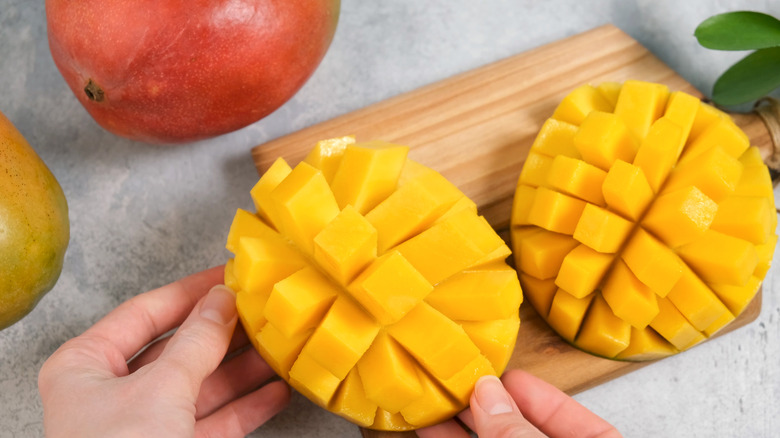What Happens To Your Body When You Eat A Mango Every Day
On a sunny, warm day, there's nothing that hits the spot like a juicy, ripe mango. This golden-yellow tropical fruit offers an irresistible and tasty flavor to many worldwide. Originally from India, mangoes are cultivated in tropical and subtropical climates across the globe (per Healthline). Popular mango producers include Mexico, Peru, and Ecuador. Its popularity in flavor and tremendous health benefits are why some consider it the "king of fruit."
Mangoes, also known as Mangifera indica L., belong to the drupe family or stone fruit family. It consists of a peel, meaty flesh, and an oblong-shaped pit. According to a 2021 abstract published in the International Journal of Environmental Research and Public Health, all different parts of the mango fruit have nutritional benefits, but the juicy pulp is where you'll find the most nutrition and health benefits. If you want to switch up your diet, consider adding this sweet fruit to your everyday eating routine.
Mangoes are versatile and easy to incorporate into your daily diet in exciting ways. Slice them and eat them fresh as a snack, add them to spicy salsa for an added twist during a summer picnic, or pair them with nutrient-dense breakfast foods – hearty oatmeal, creamy greek yogurt, or a refreshing smoothie.
Mangoes may improve digestion and help control weight
Adding this powerful fruit to your daily diet may do more than give you a flavor boost to your meal. It may actually support your digestion, according to Healthline. Researchers suggest this is due to the fruit being a rich source of fiber, containing various fatty acids and healthy antioxidants, as well as a high water content. These can all contribute to gastrointestinal wellness, and some people have even reported that mangoes lessen their symptoms of constipation.
The phytochemicals in mangoes may also aid in weight management and possibly weight loss (via WebMD). Nutritionist, Rujuta Diwekar, tells Daily Sun, "Mango is not just safe but recommended for people with diabetes and obesity for its rich nutrient profile. It is high on fiber, antioxidants, and phytonutrients." Additional evidence suggests mangoes have phytochemicals that may aid in the suppression of fat cells, according to Healthline.
The continued benefits of mangoes
According to WebMD, another benefit of mangoes is the number of essential vitamins and minerals they contain, including vitamins A, C, and K, as well as potassium, magnesium, and folate. These key nutrients can help prevent anemia, bolster collagen levels, and support healthy blood clotting. Additionally, the folate found in mangoes aids in healthy cell division, which may be particularly beneficial during pregnancy. In fact, folate is often recommended as a supplement for those who are pregnant. If that weren't enough, mangoes also offer a high dose of beta-carotene, a powerful antioxidant shown to lower your risk of cancer (per WebMD).
Eating this delicious fruit daily may do wonders for your body and can get you closer to your recommended two fruit servings per day (via Mango.org). However, if you're worried about the high sugar content found within mangoes, consult with your physician or nutritionist first to develop a dietary plan that works well for you.



